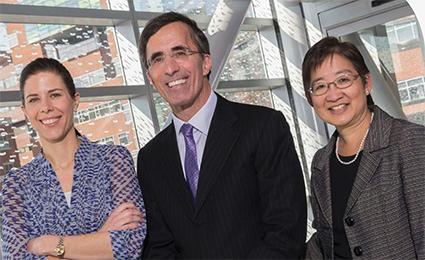
(From left: Sara Johnson, Ph.D., M.P.H., Joshua Rales and Tina Cheng, M.D., M.P.H., at Johns Hopkins Children's Center.)
WITH THE HELP OF A FAMILY FOUNDATION, the Johns Hopkins Children’s Center is launching a whole new child health enterprise, the first fully integrated school-based health clinic in the United States. Johns Hopkins faculty and staff are piloting an innovative model of education that bundles comprehensive health care into schools to help children thrive and achieve academic success.
“In short, we need to go where the kids are,” says pediatrician Tina Cheng, one of the initiative’s leaders and director of General Pediatrics and Adolescent Medicine at Johns Hopkins. “Children’s health and school performance are intertwined.”
The “kids” in this case are elementary through middle school students from families who live in Baltimore City. Cheng and fellow researchers, community and educational collaborators, are setting out to narrow the achievement gap between children from less affluent and more affluent communities in American schools by addressing the multiple health challenges in households and communities that could hinder any child.
“This enterprise is right in our sweet spot, in our wheelhouse,” says Joshua Rales, President of the Norman and Ruth Rales Foundation, which expects to invest $5 million in the $6 million project. “Our family Foundation was created to honor our parents’ legacy of championing the needs of children, living lives of integrity and leaving the world a better place than they found it. In joining forces with Johns Hopkins and the KIPP schools, we foresee tremendous potential to boost children up the academic ladder and to create a promising future that might otherwise be unimaginable to them.”
The new Ruth and Norman Rales Center for the Integration of Health and Education at Johns Hopkins Children’s Center will launch its pilot Rales Educational and Health Advancement of Youth (READY) program with KIPP Baltimore, part of a national charter school network designed to prepare students from low income / underserved communities for college and beyond. The KIPP Baltimore schools, Harmony Academy and Ujima Village Academy in Park Heights–an elementary and middle school respectively–will be the first to implement the READY program, which unites health care providers, teachers and parents, all to benefit children.
“The aspiration of this endeavor is transformative,” says Rales. “We could change the life trajectory of these children and give them an opportunity to experience the success of their peers from more affluent communities.”
The schools implementing the READY program will have a full-service health and wellness program. This includes a health clinic (the Rales Health Center), staffed by a physician, nurse practitioner and school nurse. In association with teachers and parents, they will routinely assess students’ health and developmental progress; screen for behavioral problems; provide dental screenings and referrals for dental services, keep vaccinations up-to-date; monitor and help children manage their chronic diseases such as asthma or diabetes; and provide individual and group mental health counseling. Further, wellness staff will partner with KIPP teachers to bring physical activity and health education to students during class time and after school. School wide health campaigns will focus on things like vision screening and bullying prevention. Parent and teacher conferences will include an individualized student health review, led by a school health professional who knows the student. And student families will have access to a “parent liaison” in the school that can connect them with supportive community resources, such as adult health programs.
In the community Harriet Lane Clinic at the Johns Hopkins Children’s Center, clinicians see the ill health effects of household poverty and poor living conditions on their young patients. Residing in the neighboring area of East Baltimore, patients’ substandard housing can trigger and exacerbate chronic diseases like asthma; poor diets and lack of safe areas for play and exercise contribute to rising rates of obesity and type 2 diabetes; family stressors related to impoverished circumstances or violence amplify behavioral and mental health conditions, and make critical day-to-day management of complex chronic diseases like diabetes–which takes micro-management to control– nearly impossible.
“Infusing comprehensive health care in children’s schools will be a game-changer,” says Rales. “At present, health care and education are siloed in schools throughout the nation.”
KIPP Baltimore, under the leadership of Kate Mehr, is a natural collaborative partner in this effort to lessen educational and health disparities for school children from low income / underserved communities. More than 96 percent of its students outperform their local school district peers in reading, and 92 percent in math. Nearly 100 percent graduate from high school, and most go on to college.
“KIPP’s track record makes it an ideal partner,” says Johns Hopkins’ Cheng. “It recognizes how crucial good health is to a child’s ability to focus and learn.”
A national expert in the field of health disparities, Cheng is a longtime proponent of merging health care into inner city schools. Cheng’s colleague, Sara Johnson, has found in her research that the stress of poverty and/or family dysfunction brings about biological changes in children that directly affect the way in which their brains and immune systems function, and how they respond to stress. “So, by addressing the whole range of factors that affect health and academic achievement in a setting where kids already spend time, we expect this program could have lasting positive impacts on students throughout their lives,” she says.
Cheng and Johnson will direct the Rales Center, and with Johns Hopkins and community colleagues, monitor its ongoing development. The two and their team will measure progress, while tailoring their approach along the way, so that this innovative program can be replicated elsewhere.
“We have a great partner in Johns Hopkins,” says Rales. “We all acknowledge that good physical and mental health bolsters children’s chances for academic achievement, something they can carry into adulthood and champion for their own children.”
